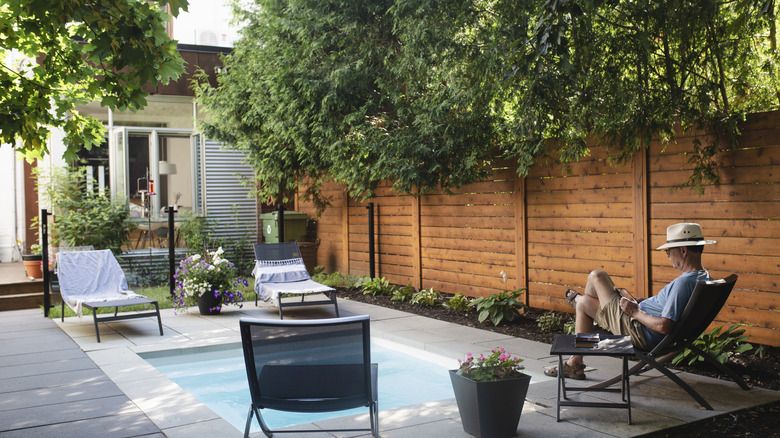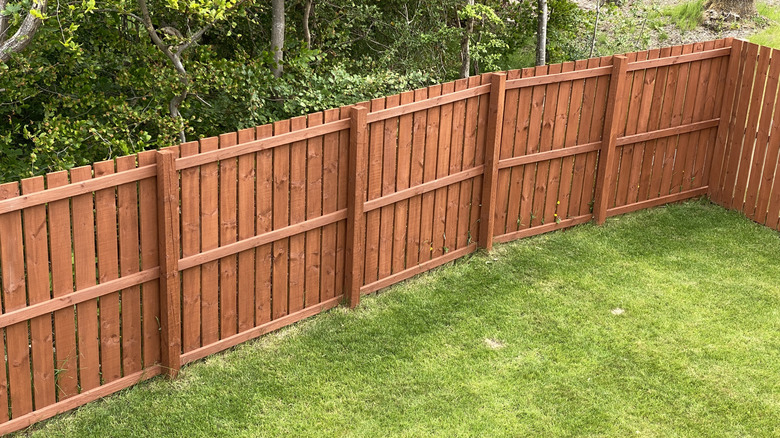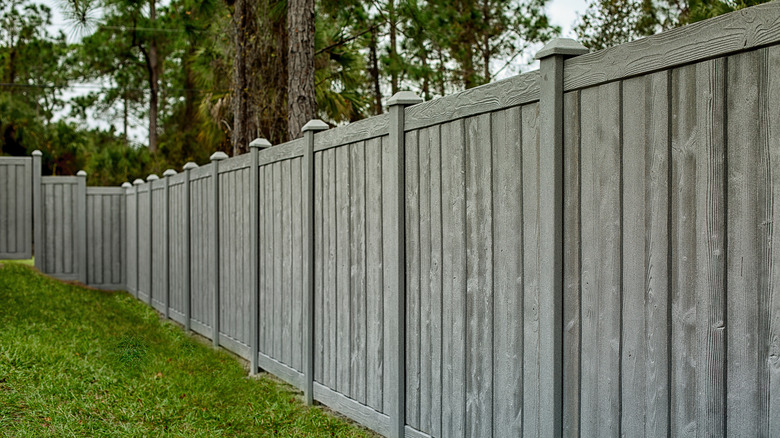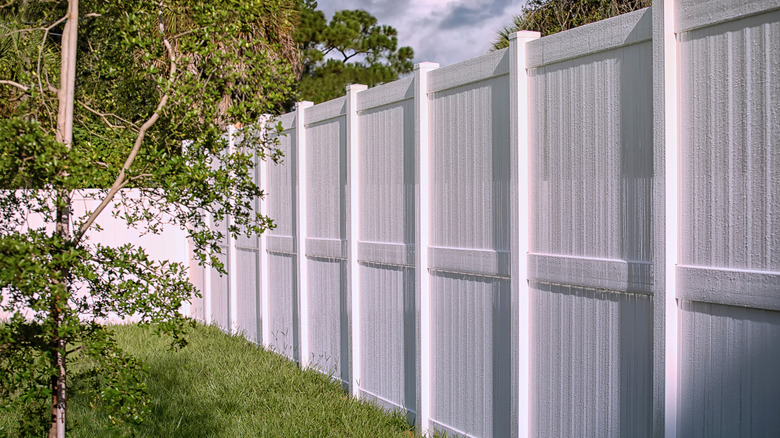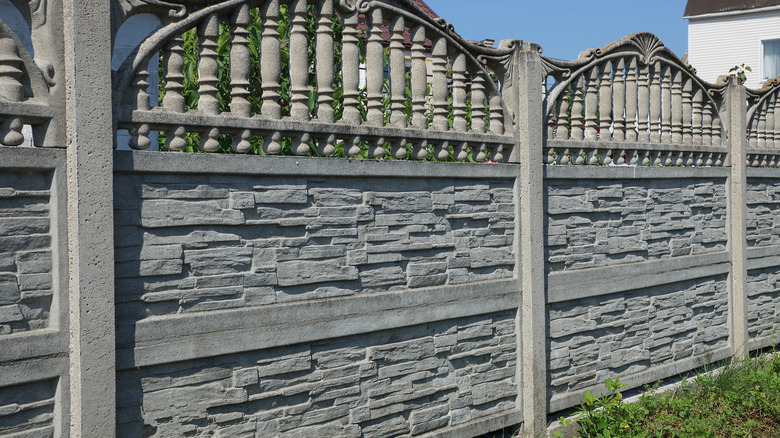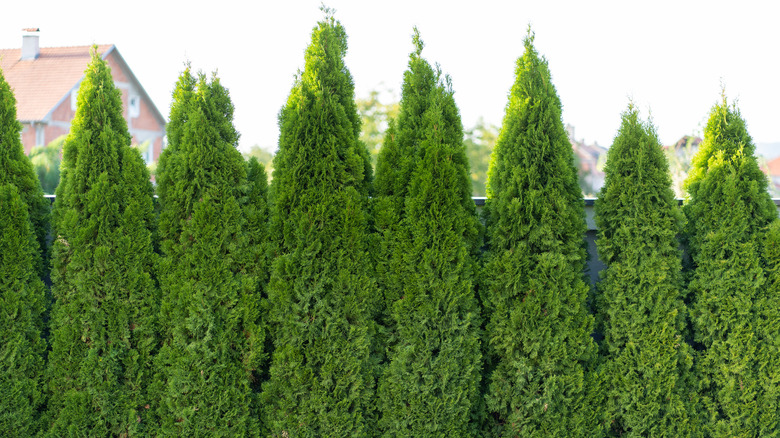Common Fence Materials That'll Help Reduce Excess Noise In Your Yard
There's nothing quite like stepping out into your yard and enjoying the sweet sounds of ... traffic? If you live anywhere near a major roadway, you'll know that it can be difficult to spend time in a noisy yard. The sounds of birds singing and leaves rustling are replaced by the honks and hum of nearby traffic. Of course, traffic isn't the only noise pollution you might encounter while trying to soak up some sunshine. Neighbors' lawn care, outdoor birthday parties down the block, or even busy commercial areas are all examples of activities that can cause excessive neighborhood noise. The solution? Fencing made from sound-reducing materials, such as wood, composite, vinyl, natural stone, or even dense shrubs and trees.
Have you ever driven down the highway and noticed large stone fences on either side of the road? The right fence can act as a sound barrier, absorbing and deflecting noise. If you're struggling to enjoy time spent in your personal slice of the great outdoors because of noise pollution, investing in a fence could be a smart solution. However, not all fences are created equal. Different materials, such as wood versus vinyl, have varying sound-damping abilities. Also consider the other pros and cons of each material, from upfront investment to longevity and maintenance.
Wood fences
Wood fencing, which is a classic choice among privacy fences, also cuts down on intrusive backyard noise — although it's likely the least effective material on this list. One way that you can judge the sound-blocking effectiveness of a fence is by its STC (Sound Transmission Class) rating. An STC rating measures how well a material, like wood, reduces noise. The higher the rating, the better the noise reduction. Wood has an STC rating of 23 — decent, but on the lower end.
To get the most sound reduction out of a wooden fence, ensure it has no gaps. The fence should be solid lengthwise and to the ground. Build it as tall as local regulations and your homeowners association (if you're subject to one) allow. Greater coverage blocks and reduces the most sound.
Although wood may not be as effective at sound blocking as other materials, such as masonry, it has additional benefits. It's a go-to option for homeowners wanting a warmer, more natural fencing solution, and it's generally affordable. Timber fences have a lower lifespan than other materials, and they need regular maintenance to keep them free from rot and insect damage.
Composite fences
If you like the appearance of wood but want a noise-reducing fence that's a bit more durable, composite is a good choice. Composite fences are made of a mixture of wood and plastic. They typically sport an overall higher price tag than timber but require less maintenance. While composite fence STC (Sound Transmission Class) ratings vary based on the blend of materials used for a specific brand, they're similar to that of wood fences — typically about 24.
The design of composite fencing plays a large role in its effectiveness at blocking out any unwanted noise. In many cases, these fences have no gaps, with each plank sitting flush against its neighbor. As mentioned, a solid fence with no gaps or holes helps to keep noise pollution out.
Composite fencing is immune to many of the issues that damage a wood fence. It's water-resistant, reducing the likelihood of rot, and durable, with a long lifespan. You'll be able to enjoy your fence for longer with less maintenance. The main downside of composite fencing is that the color of the boards can fade over time, requiring replacement.
Vinyl fences
If you're looking for a fence with more noise reduction than wood and composite, the next material to consider is vinyl. While more expensive than timber fences, vinyl fences are still a budget-friendly option. You can even choose planks that look like real wood if that's your preferred aesthetic. A polyvinyl chloride (PVC) fence won't reduce excessive noise. However, its dense composition and solid construction with few gaps make it a good noise reduction option balanced against cost and appearance. Vinyl fences have an STC (Sound Transmission Class) rating of about 26.
Not all vinyl fences are made the same. Some have thinner panels and are cheaper, but are more susceptible to damage — and less effective at blocking out sound. When deciding on the best solution for your yard, consider the average amount of noise you experience. If it's only a minor concern, then you might be able to get away with thinner vinyl fence panels. Overall, vinyl fences are considered low-maintenance. Invest in one, and you can keep neighbors' conversations out for longer, with less need for repair.
Masonry fences
Masonry fences will block out the most noise in any backyard they surround. They're not 100% effective (no fence alone can completely block all nearby noise), but have an excellent STC (Sound Transmission Class) rating of 37 or higher. That's why municipalities often erect solid concrete walls alongside highways — they effectively stop traffic noise penetrating into nearby residential areas. If you're looking for a fence to block heavy-duty noise pollution, masonry is likely your best option.
Of course, like all fencing materials, masonry isn't perfect. There are a few things to consider before installing a masonry fence in your backyard as a noise-blocking solution. Masonry fencing boasts high durability and looks elegant. However, that top-tier sound reduction comes at a price — and a high one at that. In fact, masonry fences are the highest cost option of those listed. A solid concrete fence is cheaper than decorative natural stone, but it has a decidedly industrial vibe that not everyone loves.
Property-line shrubs and trees
Maximize noise blocking by pairing your fence — no matter the material — with plants. Where fences deflect the sounds that are disrupting your outside time, dense greenery soaks them up. It can also add natural beauty to an artificial-looking fence, improving your backyard aesthetics. Here's another option: create a fence of plants alone. While it may not seem like a traditional fencing material, at least not in the suburbs, shrubs or trees can be an effective sound barrier. This may not offer the same quiet as masonry fences, but embracing living fence ideas to inspire your backyard design is an effective and multi-functional alternative.
However, to get the most out of your green fence, you'll need to choose the right plants for the job. Shrubs or trees with dense foliage that reaches right to the ground are the best for blocking noise, especially if you vary the height and size of each plant. Consider evergreens spaced 2 to 4 feet apart for year-round sound reduction. If noise is from, say, summer tourism, you could get away with deciduous perennials. Popular plant choices for noise-blocking living fences include yew, Virginia juniper, wax myrtle, cherry laurel, and even Southern magnolia, depending on the USDA Hardiness Zones you grow in and the space you have.
